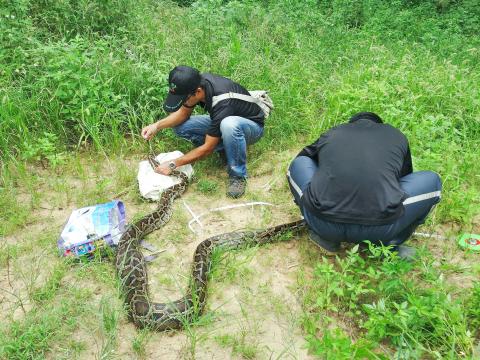In 1949, Hu Lian was the first general commander of Kinmen. In his book, “Memoirs of Kinmen” he records an interesting anecdote. At the time, to encourage the morale of front-line soldiers, he treated them to white flour noodles, but found that this was not appreciated, as the soldiers were not used to eating wheat flour noodles.
Later officers told him, there were many snakes on Kinmen, and there were even pythons weighing up to a hundred catties (60kg), several meters long. The soldiers from Guangdong Province were addicted to eating them. They would be happy eating just steamed buns, if only they could have one meal of snake every three days. They didn’t realize that eating these snakes brought disastrous consequences. After three months, there was a plague of mice. The mice ate all the grain and there were orders for Guangdong soldiers to stop catching snakes and start catching mice, thus a mouse population explosion was averted.
Snakes are recorded in folklore. In 1950, the garrison on Little Kinmen found a python as thick as a bowl. When it was moved to Kinmen it was surrounded by onlookers and caused a sensation. Four years later, soldiers going through sweet potato fields suddenly heard a farm woman shouting “Big snake, big snake!” When they looked, it was a brown patterned python. Some people also saw pythons among the tombs, and in Tatan Island there were even rumors of horned snakes. All these folklore tales indicate that in the one hundred and fifty square kilometers of Kinmen Island, there were always pythons.

Photo: CNA
照片:中央社
Interestingly, from 1970s up to the year 2001, the big snakes seemed to suddenly disappear and there were no more traces of pythons in folklore.
In the early 2000s, there were once again sporadic reports of pythons in the area. In 2006, a member of the public caught a Burmese python and gave it to the Kinmen Livestock Research Institute. After this, there were reports of Burmese pythons swallowing lambs, chickens and ducks in farms on both Little Kinmen and Kinmen.
(Liberty Times, Translated by Clare Lear)
民國三十八年擔任金門首任司令官的胡璉將軍,在著作「金門憶舊」裡,記載一段有趣的小故事:當年為鼓勵前線官兵士氣,犒勞士兵雪白洋麵,卻遭官兵以「吃不慣麵粉」打臉。
後來有幹部回答,金門蛇多,且有蟒重可達百斤、長約數丈,粵兵嗜之如命,如能三天吃到一餐,就算配饅頭都能下嚥。沒想到吃蛇帶來嚴重後果:三個月後鼠疫發生,糧食農作受波及,直到下令限制粵籍士兵捕蛇並發動捕鼠,風波才告平息。
民間采風也有紀錄,民國三十九年小金門駐軍發現如大碗粗大的蟒蛇,海運到大金門時「觀者如堵」,引起轟動。相隔四年,又有軍人經過地瓜田,忽聞農婦高喊「大蛇、大蛇」,一看是黃褐色花紋的巨蟒;還有民眾看到蟒蛇在古墓出沒,甚至在大膽島看到「長角的蟒蛇」等傳說。凡此種種,說明一百五十平方公里的金門島,早就有所謂的「蟒蛇」存在。
有趣的是,從民國六十年代至九十年間,「大蛇」好像憑空消失,民間未聞「蟒」跡。
民國九十年代初期,金門又開始有零散蟒蹤,九十五年有人撿到一尾緬甸蟒交給金門畜試所。此後,大、小金門陸續傳出有農舍小羊、雞、鴨遭緬甸蟒吞噬紀錄。
(自由時報報導)

Nestled in the mountain region of northern Taiwan lies a small village that was once bustling due to a thriving coal industry, only to later gain fame for an entirely different reason — cats. This is Houtong Cat Village (猴硐貓村), located in Ruifang District, New Taipei City. Traditional Coal Mining and Village Transformation Houtong was originally known as “Monkey Cave” (houtong, 猴洞), a name derived from the wild monkeys that once inhabited caves in the surrounding hills. During the Japanese colonial period in the early 20th century, rich coal deposits were discovered and developed, rapidly turning Houtong into one of northern Taiwan’s

People use far more than just spoken language to communicate. Apart from using our voices to pronounce words, we also use body language, which includes countless facial expressions. Most people know that smiles and frowns indicate pleasure and displeasure, or that wide eyes with raised eyebrows typically show surprise. However, there is a lot more to learn about how facial expressions can help or hinder communication. People often unintentionally reveal their emotions through very tiny facial movements known as “microexpressions.” The term was popularized by psychologist Paul Ekman, who found that people from cultures across the world generally recognize

Beatboxing is the art of making drum sounds using nothing but your mouth, lips, tongue, and voice. This incredible skill turns your voice into a personal drum kit, allowing you to create beats and rhythms that sound just like those of real instruments. Born from hip-hop culture in the 1980s, beatboxing has evolved into a global form of musical expression found in various genres. What makes beatboxing so special? First, it requires no equipment at all. This accessibility allows you to develop your musical sense and rhythm skills wherever you are. Plus, beatboxing is a fantastic way to express

對話 Dialogue 清清:氣象預報說週末好像有寒流,天氣這麼冷,我只想宅在家裡。 Qīngqīng: Qìxiàng yùbào shuō zhōumò hǎoxiàng yǒu hánliú, tiānqì zhème lěng, wǒ zhǐ xiǎng zhái zài jiālǐ. 華華:說到這個,我週末想約剛認識的新朋友出去玩,但寒流來的話戶外活動可能不太合適,我還不知道要做什麼好。 Huáhua: Shuō dào zhège, wǒ zhōumò xiǎng yuē gāng rènshí de xīn péngyǒu chūqù wán, dàn hánliú lái de huà hùwài huódòng kěnéng bú tài héshì, wǒ hái bù zhīdào yào zuò shénme hǎo. 清清:要不要考慮去玩密室脫逃?我以前跟朋友去過,很好玩,而且不怕風吹雨淋。 Qīngqīng: Yào bú yào kǎolǜ qù wán mìshì tuōtáo? Wǒ yǐqián gēn péngyǒu qù guò, hěn hǎowán, érqiě bú pà fēng chuī yǔ lín. 華華:我覺得不錯,可是我們才剛認識,會不會太尷尬? Huáhua: Wǒ juéde búcuò, kěshì wǒmen cái gāng rènshí, huì bú huì tài gāngà? 清清:不會啦!玩密室脫逃需要大家一起合作,反而更容易變熟。 Qīngqīng: Bú huì la! Wán mìshì tuōtáo xūyào dàjiā yìqǐ hézuò, fǎn’ér gèng róngyì